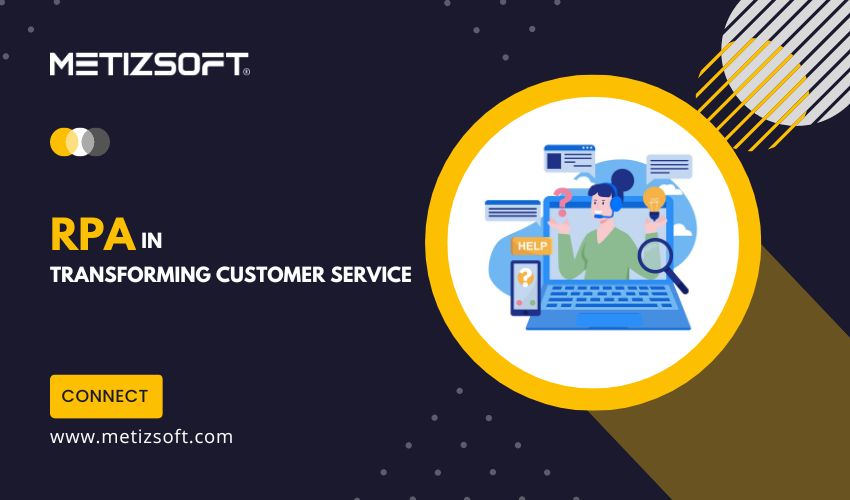
When Robotic Process Automation, RPA made it to the digital landscape, no one believed it to be progress like it is today. But, to everyone’s surprise, every industry has welcomed it. Now, with a whooping global market size of 2.3 USD billion in 2022, it is ruling like no other techstack.
Anyway, of all the other industries, the one that has significantly benefitted from RPA is none other than customer service. RPA, with its game-changing capabilities, has transformed the industry inside out. It has reduced the gap between customer and service provider interactions.
In this blog, we will talk more about RPA in customer service. Also, we will walk through its use cases and benefits to help understand its role in transforming the industry.
Table of Contents
RPA in Customer Service – Overview!
Robotic Process Automation (RPA) in customer service refers to RPA technologies that have been applied to automate and streamline all customer services. This segment includes call center process automation, deploying chatbots to assist customers, implementing voice assistants, and much more.
Automating specific customer interactions with RPA allows agents to focus on critical interactions and provide immediate responses to more straightforward inquiries.
RPA is the solution to all customer service obstacles
RPA has come as a savior for customer service in many ways. RPA-based solutions are commonly used to address simple and repetitive customer complaints.
Minimal Data Visibility and Insights – Siloed data across different systems can hinder understanding customer needs and preferences. RPA can integrate with various systems, consolidate data, and provide real-time insights, enabling personalized recommendations and proactive support.
Inconsistent Customer Experience – Customers today expect seamless interactions across touchpoints, whether online, in-app, or via phone. RPA can automate repetitive tasks across these channels. It ensures consistent processes and information delivery, leading to a smoother experience.
Lack of Personalization and Automation – Customers desire personalized experiences tailored to their needs. RPA can analyze customer data and preferences to trigger automated actions, such as sending targeted offers or recommending relevant products, enhancing engagement and satisfaction.
Get more done with these RPA benefits
Robotic Process Automation, aka RPA, offers numerous benefits to customer service. These benefits lead to higher productivity and efficiency while saving time and cost. Some of the notable benefits include the following:
Cost Effective – RPA, or Robotic Process Automation, helps to reduce processing costs by decreasing the average handle time (AHT) for customer service representatives.
Enhance Process – RPA improves the predictability of processes, ensures compliance, and reduces errors, enabling seamless recording of system changes.
Simplified Workflow – RPA preloads customer context and retrieves necessary information from multiple applications, streamlining the agent’s workflow.
Streamline Deployment – RPA ensures quick implementation without removing or replacing existing assets, maximizing their value and efficiency.
Improve Efficiency – RPA automates tasks such as gathering information and updating customer data, resulting in faster issue resolution.
Improves Customer Feedback – RPA facilitates automated self-service assistance, resulting in faster response times, improved handling of customer feedback, and satisfaction data.
Reduce Errors – RPA ensures error-free 24/7 data processing, improving outcomes and minimizing error rates.
Top RPA use cases for exceptional customer experiences
You can automate various customer service tasks using RPA. Here are some notable customer service RPA use cases that signify RPA capabilities.
Data Collection & Analysis – RPA technology streamlines data collection, automating retrieval from various systems for accurate and timely analysis. By automating data retrieval from various systems, RPA streamlines the process and ensures accurate and timely data for analysis.
Error Reduction – RPA eliminates data errors by cross-referencing data, verifying customer information, and preventing file transfer duplicates. Bots cross-check and validate data, reducing inaccuracies and enhancing the reliability of customer information.
Resolve Rule-based Issues – Issue information is gathered and saved in the ticket system through RPA bots. These bots automatically access the ticket database and resolve customer queries, such as:
- Customer login information or password update or renew
- Order modification (request return code, change delivery address)
- Payment information modification (COD, credit card number)
Automate Responses – RPA botspull data from multiple databases, analyze customer inquiries, and provide standardized responses via whatsApp, texts, or emails responding to customer requests or queries.
For example:-
- Generate general logistics information about shipment and delay process.
- Shopping and marketing queries related to coupons, gifts, and product promotions.
- Finance queries, which involve invoices, logins, etc.
24*7 Availability – RPA works 24*7 without any errors or complaints. Well, this is the least we can expect from a bot. This has allowed businesses to provide customer service and support at any time with the help of automated processes and virtual assistants. It has helped them offer convenient and quick responses outside regular working hours.
Bottom Line!
Customers now expect 24/7 high-quality customer service through their preferred channels. They need more patience and want every question to be sorted out smoothly.
Hence, customer service industries must plan quick adoption of RPA and thrive in the ever-evolving market. They can enable help from RPA development companies like Metizsoft Solutions. Our team of RPA Experts enables fast solution development and implementation.
AboutManthan Bhavsar
Related Posts
Robotic Process Automation (RPA) – Definition and Types!
Over the years, humans have been the driving force of all business. They still are, though, with the support of technological...
RPA Role & Impact in the Logistics & Transportation Industry!
In a rapidly growing and competitive era of technology, every other company and business is streamlining their business...

